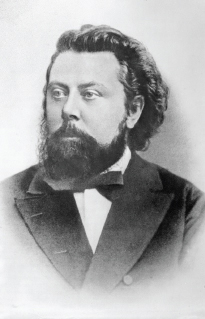Biography: Modest Musorgsky (1839–1881)

Musorgsky (pronounced MOO-sorgsky) was the son of a well-
In the meantime, the emancipation of the serfs and other political and economic changes in Russia caused the liquidation of his family estate. For a time Musorgsky tried to help run the family affairs, but in his twenties he was obliged to work at a clerical job. Meanwhile, he experimented with musical composition, struggling to master the technique of an art that he had come to late in life. It was around this time that he joined the circle of Russian nationalist composers that was dubbed the kuchka (the Group; see page 284).
Musorgsky never felt secure in his technique and relied on his skillful kuchka friend, Nikolai Rimsky-
Musorgsky led a rather grim life; his was a personality filled with self-
Chief Works: Operas: Boris Godunov and Khovanschina ◼ Orchestral program compositions: Pictures at an Exhibition (originally for piano) and Night on Bald Mountain ◼ Songs, including the very impressive song cycles The Nursery and Songs and Dances of Death
Encore: After Pictures, listen to Night on Bald Mountain and Boris Godunov, Coronation Scene (scene ii).
Image credit: Bettmann/CORBIS.